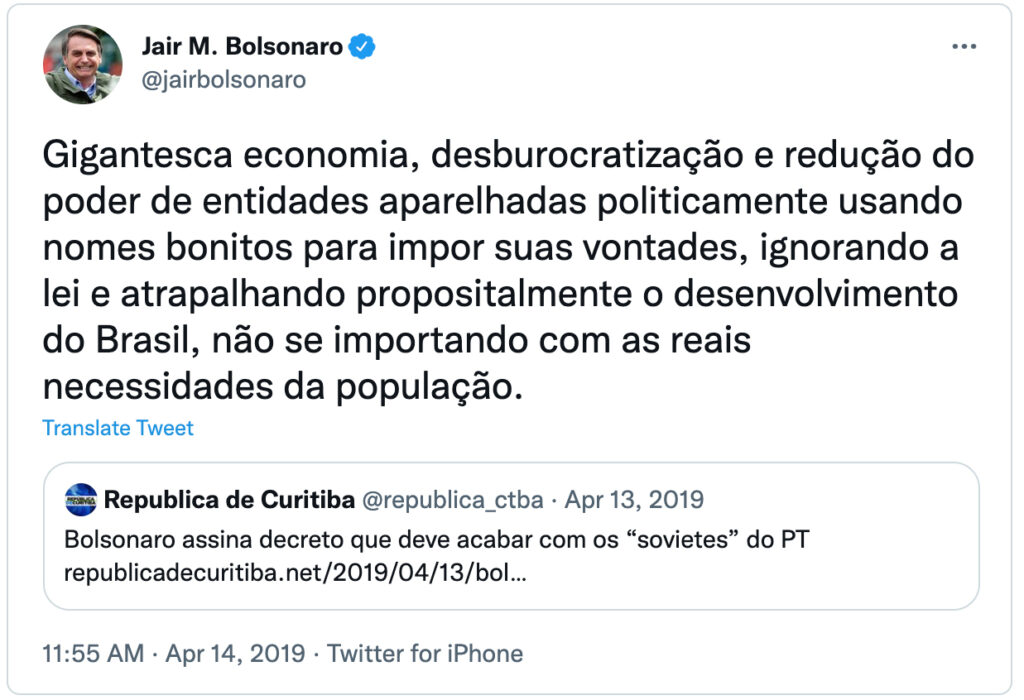Video reveals plot between congressman Marcelo Moraes (PTB-RS) and the minister to breach international treaty
With connections to tobacco industry interests, federal representative Marcelo Moraes (PTB-RS) admitted on video to having taken part in a scheme to put an end to Conicq, the National Committee for the Implementation of the Framework Convention on Tobacco Control (Comissão Nacional para a Implementação da Convenção-Quadro para o Controle do Tabaco).
Moraes stated he had been “one of the people to promote a meeting, right at the beginning of the current administration’s term, for the extinction” of the government department which for 18 years has been essential to tobacco control policies in Brazil.
According to Moraes, who is one of the deputy leaders of the Jair Bolsonaro administration in the House of Representatives, this “move” relied on support from current Minister for Labor and Social Security Onyx Lorenzoni.
“Onyx was at the Segov (Government State Department), right? And there we agreed, then, on the termination of Conicq – which was done away with there and then”, said Moraes.
The point in time to which the congressman refers is April 11th 2019, when Bolsonaro and Onyx signed a decree (nº 9.759) with the intention of putting an end to all collegiates which, as Conicq, are connected to the Federal Civil Service Administration.
Days after the publication of the decree, the president re-tweeted a profile named Republic of Curitiba, which stated that the measure was putting an end to the “soviet-biased PT (Workers’ Party) members”. Bolsonaro himself wrote that the decree would reduce the “power of politically armed entities using fancy names in order to get their way”.

Coincidentally or not, Marcelo Moraes says in the video that he presented Onyx with “photos and evidence of the people who were at the forefront of this Conicq movement all huddled together with Jean Wyllys [former federal congressman with PSOL, currently in PT], with the Out with Bolsonaro (“Fora Bolsonaro”) movement, that type of thing”.
Contrary to other collegiates, which have civil society participation, Conicq is composed only of government members, with referrals from ministries and Anvisa (Brazilian Health Surveillance Agency).
When the decree was published, Lorenzoni was the Presidential Chief of Staff, a position he held until February 14th, 2020.
He never held a Segov position, as Moraes said. But the slight confusion with regard to the positions held by Onyx Lorenzoni is understandable: there have been four of them since the beginning of this administration.
“Once again, minister Onyx is on the scene”
The account by Moraes regarding Lorenzoni’s actions is not limited to the publishing of the decree.
“There was an attempt, some time ago, to recreate Conicq”, he said, referring to the administrative proceedings in May 2019 by the National Cancer Institute (Inca), the agency connected to the Health Ministry which runs the committee’s daily routine.
“At that point in time, once again minister Onyx swung into action”, states Moraes in the video.
“Onyx made a move to try to put an end to this idea of recreating Conicq”, said the congressman, emphasizing that “Onyx identified this and immediately called whoever was setting it up and, once again, brought down Conicq”.
According to details provided by the congressman himself, this second move allegedly occurred when Onyx was in Office as the Secretary-General of the Presidency, which he held between February 12th and July 28th, 2021.
All these declarations were made by the parliamentary member on August 12th 2021, at a meeting with the Tobacco Production Chain Sectorial Chamber, a collegiate group associated with the Ministry of Agriculture, Livestock and Supply (Mapa), which is filled with tobacco industry representatives.
The video with footage of the meeting was obtained by Joio via the Law of Access to Information (Lei de Acesso à Informação – LAI).
Onyx was contacted to comment on the statements given by Moraes, through the Ministry of Labor and Social Security Communications Department. The Government Department commanded by him did not answer until the report deadline.
Double Agent
The moves made by Marcelo Moraes are not the only thing that draws one’s attention in this video.
Nelson de Andrade Junior, currently Cabinet Chief at the Department of Family Farming and Cooperativism for Mapa, also appears plotting against Conicq.
He offers to seek arguments to “bar, boycott or, in summary, use any means necessary” against the National Committee for the Implementation of the Framework Convention for Tobacco Control.
Andrade Junior is in a privileged position for this, since he has been the Mapa representative on the committee since April 2019.
On September 9th last year, almost one month after that meeting, he signed a Conicq document stating that he had no conflict of interests nor any connection with the tobacco industry.
In the document, obtained by Joio via the LAI, he denies having, or having had, within the previous years, any position of employment or other type of relationship with entities involved with the production, manufacture, distribution or sale of tobacco products.
The Tobacco Production Chain Sectorial Chamber, where Moraes and Andrade Junior made their statements, is composed of entities such as SindiTabaco and Abifumo, who represent the dominant multinationals in the business, companies such as British American Tobacco (BAT), Philip Morris and Japan Tobacco International (JTI).
Andrade Junior appears on video reading out a document to industry representatives in which Conicq summons its members to a meeting. “Conicq is active”, he warns.
A report by the Office of the Attorney-General (Advocacia-Geral da União – AGU) in July 2021 concluded that Conicq was not abolished by decree nº 9.759 and could, therefore, continue its functions. According to the AGU, the committee’s attributions are named in the decree which in 2006 formalized Brazil’s accession to the Framework Convention on Tobacco Control. The decree carries a status equal to law because international treaties are incorporated in this way to the Brazilian legal framework.
At that point, however, the Tobacco Sectorial Chamber members were not aware of this statement by the AGU.
Marcelo Moraes demanded: “We must have some information from you, Nelson. First of all, are they still meeting unofficially or are they recognized by the government?”
“Congressman Moraes, I think that is correct”, agreed Nelson de Andrade Junior – who later in the meeting would reinforce: “As far as I’m concerned, sir, fine. I’ll look into all the information”.
The Ministry of Agriculture was contacted to comment on Andrade Junior’s actions, but there was no answer.
Treaty carries obligations for Brazil
Adriana Carvalho, a lawyer specializing in disputes against the tobacco industry and General Counsel for the ACT Promoção da Saúde NGO, considers the actions of Moraes and Andrade Junior to be heading in the opposite direction of the obligations taken on by Brazil before the Framework Convention.
“We are talking about an international treaty which was ratified by this country, who took on obligations. From that point on, control of tobacco consumption became a State, not government, policy. And when I say State, I am referring to all spheres: Executive, Legislative and Judiciary Branches”, she concludes.
According to Carvalho, one of the obligations of the Convention is for each country to have a national coordination structure for tobacco control policies – which in the case of Brazil, lies with Conicq.
“So when you have a public agency and a congressman openly stating their intention to act against Conicq, that’s very serious. They are acting in favor of financial interests, not in the public interest.”
“He’s open, he’s a real pal, a really great guy”
Marcelo Moraes also proposed a strategy to conduct Brazil’s position in COP 9, the ninth edition of the Party Conference for the WHO Framework Convention on Tobacco Control, which took place two months after the recording, in November 2021.
The idea was for a convoy from the tobacco industry, formed by lobbyists and members of parliament, to get together with Foreign Affairs minister Carlos Alberto França – who in the words of Moraes is “open, a real pal, a really great guy” –, with Agriculture Minister Tereza Cristina, and also with Onyx Lorenzoni.
“First, because [Onyx] is in a strategic position and second, because he’s a gaúcho [from the State of Rio Grande do Sul], is aware of the reality of the tobacco industry and its importance to exports in Rio Grande do Sul”, he explained.
Onyx met the delegation on August 25th. This meeting does not appear on his official agenda.
The liaison with the Brazilian Foreign Affairs Office (Itamaraty) and Mapa had an objective: to remove the Health Ministry from the loop – or pave the way for Health minister Marcelo Queiroga to play a game of doubles on the tobacco industry’s side.
“If we go to the Health Ministry, there is no way for them to publicly state that they are in favor [of the tobacco production chain]… They can’t even consider doing that”, said Moraes weighing up the situation
“However, if we go down another path and are able to talk to to the Ministry for Foreign Affairs – to França – as well as to minister Tereza Cristina, from the Agriculture Ministry, we will soon start to move in parallel and have the Health Ministry not get involved in any way, but at the same time taking the same stance as those other two ministries”, revealed the federal representative.
For this batch of meetings, Moraes proposed inviting other parliamentary members from the tobacco bench. “Let’s invite Alceu [Moreira], Heitor Schuch, [Luis Carlos] Heinze and we’ll split up the tasks, folks!”
On September 17th, Senator Luis Carlos Heinze (Progressistas Party-RS) was met by Minister França.
The Itamaraty counsel did not respond to the report’s request to comment.
As reported by Joio, the strategy proposed by Marcelo Moraes worked, up to page 2.
The Inca technicians active within Conicq were removed from the COP 9 Brazilian delegation by the Health Ministry a few hours before the conference began.
Sources reported to Joio that the government department justified this decision contending that it was necessary to ‘lose a bit now, in order to win later’, implicitly referring to the pressure exerted by the tobacco industry.
The articulation with Itamaraty intended by Moraes does not, however, seem to have borne fruit.
The diplomats who led the Brazilian delegation followed the document prepared by Conicq to the letter, with guidelines referring to Brazil’s position in regard to the themes debated at COP 9.
When the Ministry of Health was contacted to provide a comment, they answered that the theme is an attribution under Inca. Inca, who were also contacted, preferred not to comment.
Moraes has narrow ties to industry
Back in 2014, when financial backing by the business sector for political campaigns was still allowed, Marcelo Moraes received R$ 27 thousand from Philip Morris and R$ 20 thousand from Alliance One, one of the world’s largest tobacco exporters. In the elections of that year he was re-elected as state representative for Rio Grande do Sul.
Moraes comes from a family with a long track record of services rendered to the industry. The most well-known member of the clan is his father, Sérgio Moraes (PTB-RS), who throughout three terms in office at the House of Representatives acted in the defense of tobacco companies.
The family’s electoral stronghold sits in the Vale do Rio Pardo region, the highest concentration of tobacco production in Brazil.
Marcelo Moraes did not respond to a request to comment made by Joio.

